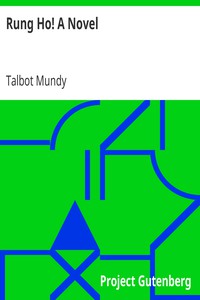Rung Ho! A Novel, Talbot Mundy [free ebook reader for ipad .txt] 📗

- Author: Talbot Mundy
Book online «Rung Ho! A Novel, Talbot Mundy [free ebook reader for ipad .txt] 📗». Author Talbot Mundy
“A horse or two, that's all.”
“How many horses, sahib?”
“Oh, not more than one each.”
The Maharajah pulled a wry face, but bowed assent. It would empty his stables very nearly, but he knew when he could not help himself. Mahommed Gunga clapped a hand to his mouth and left the vault hurriedly.
“You understand this is not a demand, Maharajah-sahib. I take it that you offer me these horses as an act of royal courtesy and as additional proof of friendliness?”
“Surely, sahib.”
“My men will be very grateful to you. This will enable them to reach the scene of action with their own horses in good shape. I'm sure it's awfully good of you to have offered them!”
Outside, where the late afternoon sun was gradually letting things cool down, Mahommed Gunga leaned against the wall and roared with laughter, as he explained a few details to the admiring troopers.
“A horse or two, says he! How many? Oh, just a horse or two, Maharajah-sahib—merely a horse apiece! Fifteen hundred horses! A horse or two! Oh-ha-ha-ha-ha-ha-ho! Allah! But that boy will make a better soldier than his father! As a favor, he asked them—no compulsion, mind you—just as a favor! Allah! What is he asking now, I wonder! Ha-ha-ha-ha-ha-ho-ho-ho!”
And inside, with a perfectly straight face and almost ghastly generosity, young Cunningham proceeded to impose on Howrah the transferred, unwelcome, perilous allegiance of Jaimihr's reassembling army. The mere keeping of it in subjection, it was realized by donor and recipient alike, would keep the Maharajah's hands full.
“Are you satisfied that your homes will be safe, now?” he asked Alwa. And Alwa looked him in the eyes and grinned.
CHAPTER XXXIV Now, fifteen hundred, horse and man, Reel at the word of one! Loosed by the brazen trumpet's peal— Knee to knee and toe on heel— Troop on troop the squadrons wheel Outbrazening the sun!
WITHIN a fortnight of the outbreak of the mutiny, men spoke with bated breath about the Act of God. It burst at the moment when India's reins were in the hands of some of the worst incompetents in history. A week found strong men in control of things—the right men, with the right handful behind them.
Some of the men in charge went mad, and were relieved. Some threw up their commands. Some of the worst incompetents were killed by the mutineers, and more than one man who could have changed the course of history for the worse were taken sick and died. Instead of finding themselves faced by spineless nincompoops, the rebels reeled before the sudden, well-timed tactics of real officers with eyes and ears and brains. The mask was off on both sides, and the sudden, stripped efficiency of one was no less disconcerting than the unexpected rebellion of the other.
Byng-bahadur—“Byng the Brigadier”—was in command of a force again within three days of the news of the first massacre; and because he was Byng, with Byng's record, and Byng's ability to handle loyal natives, the men who succeeded to the reins packed him off at once with a free hand, and with no other orders than to hit, hit hard, and keep on hitting.
“Go for them, Byng, old man. Live off the country, keep moving, and don't let 'em guess once what your next move's going to be!”
So Byng recruited as he went, and struck like a brain-controlled tornado at whatever crossed his path. But irreparable damage had been done before the old school was relieved, and Byng—like others—was terribly short of men. Many of his own irregulars were so enraged at having been disbanded at a moment's notice that they refused to return to him. Their honor, as they saw it, had been outraged. Only two British regiments could be spared him, and they were both thinned by sickness from the first. They were Sikhs, who formed the bulk of his headquarterless brigade, and many of them were last-minute friends, who came to him unorganized and almost utterly undrilled.
But Byng was a man of genius, and his bare reputation was enough to offset much in the way of unpreparedness. He coaxed and licked and praised his new men into shape as he went along; within a week he had stormed Deeseera, blowing up their greatest reserve of ammunition and momentarily stunning the rebellion's leaders. But cholera took charge in the city, and two days later found him hurrying out again, to camp where there was uncontaminated water, on rising ground that gave him the command of three main roads. It was there that the rebels cornered him.
They blew up a hundred-yard-long bridge behind him at the one point where a swiftly running river could be crossed, and from two other sides at once mutinied native regiments and thousands from the countryside flocked, hurrying to take a hand in what seemed destined to be Byng's last action. The fact that so many swaggering soldier Sikhs were cornered with him was sufficient in itself to bring out Hindoo and Mohammedan alike.
The mutinous regiments had all been drilled and taught by British officers until they were as nearly perfect as the military knowledge of the day could make them; the fact that they had killed their officers only served to make them savage without detracting much from their efficiency. They had native officers quite capable of taking charge, and sense enough to retain their discipline.
So Byng intrenched himself on the gradual rise, and sent out as many messengers as he could spare to bring reinforcements from whatever source obtainable. Then, when almost none came, he got ready to die where he stood, using all the soldier gift he had to put courage into the last-ditch loyalists who offered to die with him. He had counted most on aid from Cunningham and Mahommed Gunga, but that source seemed to have failed him; and he gave up hope of their arrival when a body of several thousand rebels took up position on his flank and cut off approach from the direction whence Cunningham should come.
The sun blazed down like molten hell on sick and wounded. Rotting carcasses of horses and cattle, killed by the rebels' artillery-fire, lay stenching here and there, and there was no possibility of disposing of them. A day came very soon, indeed, when horse, or occasional transport bullock, was all there was to eat, and a night came when Govind Singh, the leader of the Sikhs, came to him and remonstrated.
The old man had to be carried to Byng's tent, for a round shot had disabled him, and he had himself set down by the tent-door, where the General sat on a camp-stool.
“General-sahib, I have not been asked for advice; I am here to offer it.”
The huge black dome of heaven was punctuated by a billion dots of steely white that looked like pin-pricks. All the light there was came from the fitful watch-fires, where even the wagons were being burned now that the meagre supply of rough timber was giving out. The rebels, too, were burning everything on which they could lay their hands, and from between





Comments (0)